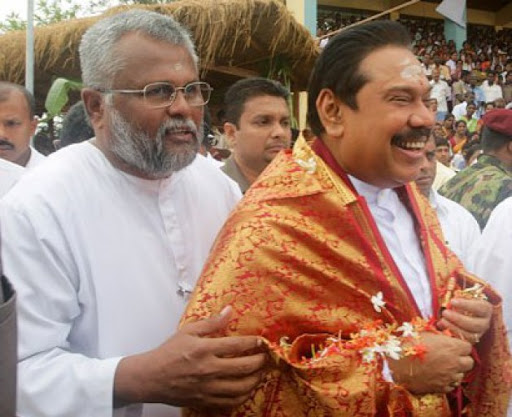
As Sri Lanka’s embattled president looks to reshuffle his cabinet in a bid to quell ongoing anti-government protests, one position remains entirely unchanged from before the demonstrations began – the appointment of Douglas Devavanda as Sri Lanka’s fisheries minister.
Devananda heads the notorious Eelam People’s Democratic Party (EPDP), a paramilitary organisation that continues to remain close to the ruling Rajapaksa regime. Devananda, was elected to Parliament in 1994 and aligned with the government as it battled against the Liberation Tigers of Tamil Eelam (LTTE) and launched multiple military offensives. He has been rewarded with several ministerial posts throughout the years, including Minister of Social Services and Social Welfare, Minister of Agriculture, Marketing Development, Hindu Education Affairs and currently remains the Minister of fisheries.
In 2012, the Sri Lankan government sent him to the UN Human Rights Council as part of its official delegation to Geneva.
Throughout the armed conflict the EPDP was armed and backed by the Sri Lankan state, carrying out a series of war crimes and other human rights violations. The EPDP was one of several paramilitary groups, including the Karuna faction, which was utilised by the Sri Lankan government.
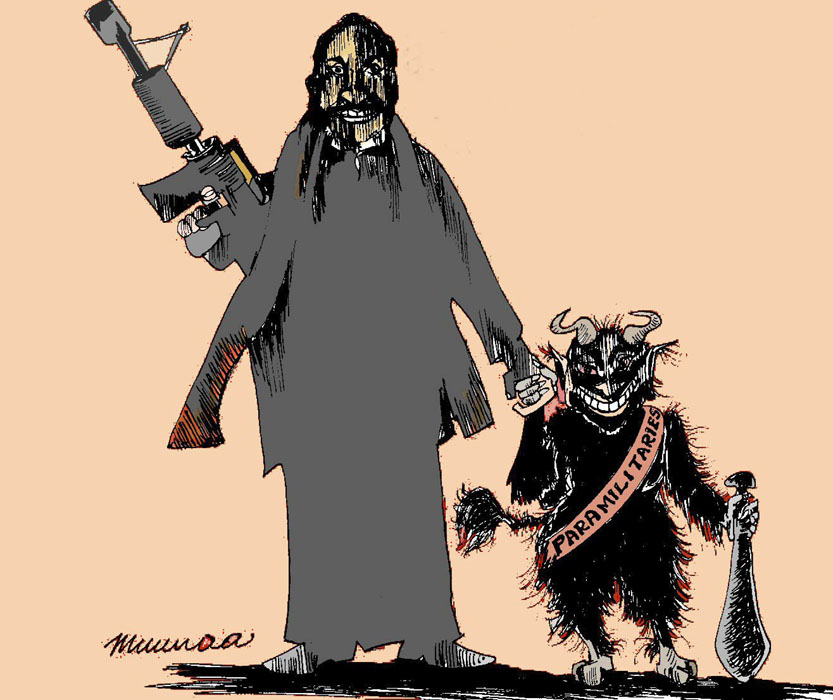
Extensive details regarding the EPDP's activities can be found in a secret US embassy cable from 2007, which was leaked to the public in 2010.
It outlines in detail how the US was well aware in 2007 of the extent of Sri Lanka’s active use of Tamil paramilitaries as an integral part of its war against the LTTE. At the time the US cable said “the EPDP remains a feared paramilitary group, wielding non-official power over parts of the Jaffna peninsula and especially the offshore islands with the tacit approval of the Sri Lanka Army”.
We look at a few of the crimes that Devananda’s EPDP is accused of below.
Child trafficking and sexual violence
According to the US embassy cable, Stephen Sunthararaj, then-Coordinator for the Child Protection Unit of World Vision in Jaffna, told them that the “EPDP is operating child trafficking rings in Jaffna with a base on Delft island, which the EPDP "owns."”
The cable continues,
“because of the large number of widows in Jaffna, men associated with the EPDP, often from neighboring villages, are used to seduce women with children, especially girls, with the promise of economic protection. After establishing a relationship, the men then take the children, sometimes by force and sometimes with the promise that they will be provided a better life.
The children are sold into slavery, usually boys to work camps and girls to prostitution rings, through EPDP's networks in India and Malaysia.”
Sunthararaj goes on to add, “children are often smuggled out of the country with the help of a corrupt Customs and Immigration official at Bandaranaike International Airport in Colombo”.
The US states that Sunthararaj was “partially verified” by Government Agent Ganesh who said “the EPDP works in concert with the Sri Lanka Army (SLA) to operate Tamil prostitution rings for the soldiers”.
Ganesh added;
“young women were taken and forced to have sex with between five and ten soldiers a night. Sometimes they are paid approximately a dollar for each "service."”
“The young women's parents are unable to complain to authorities for fear of retribution and because doing so would ruin the girls' reputation, making it impossible for them ever to marry. Families have begun arranging marriages for their daughters at a very young age in the hopes that the EPDP and soldiers will be less likely to take them.”
Also see: Former EPDP member sentenced to death for rape and murder of 12-year-old
Abductions
The paramilitary organisation has been accused of working in tandem with the state to carry out several abductions and forced disappearances.
One striking case, is that of Stephen Sunthararaj, the well-known activist who had documented cases of child abuse as part of his work as Coordinator for the Child Protection Unit of World Vision in Jaffna. He was the activist that was quoted in the US embassy cable divulging details of the EPDP’s child trafficking rings in the North-East.
In 2007, he moved to Colombo after facing threats in the North-East due to his work. On February 12, 2009, members of the STF tried to force Sunthararaj into a van as he was leaving his office in Colombo. He was subsequently taken to Kollupitiya police station in the capital, where he was formally detained without charge under the Prevention of Terrorism Act (PTA).
His wife received a phone call soon after from an anonymous number warning her, that “even if you get Stephen released from police, we will see that he is lifted again”. Another call warned that Stephen would be tortured unless a million rupees was paid in ransom.
After almost 3 months in detention he was finally released on May 7, 2009.
On the day Suntharaj was released, he was forcibly disappeared. His wife is still searching for answers.
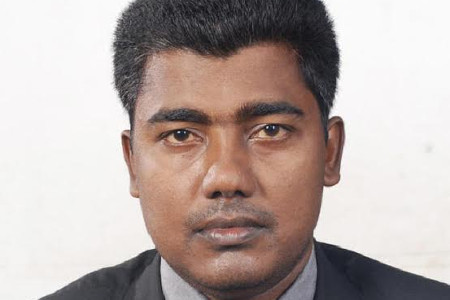
Read more in our feature: Still searching for Stephen Sunthararaj
The EPDP's history of abductiosn spans back several decades. A US State Department report observed on January 31, 1994, “in the latter part of 1993, Government security forces and alleged Tamil militias began operating what many human rights monitors called ‘a parallel system of secret detention’ in Colombo. … A fundamental rights application was filed in the Supreme Court against the leader of one such militia, the EPDP, alleging illegal abduction and torture.”
In 2015, Father Elil Rajendran delivered a speech at the BMICH, stating, "paramilitary groups especially EPDP in Jaffna after the capture of the Jaffna peninsula in 1996 and the Karuna group after 2004 in the East, carried out enforced disappearances in collusion with the state".
Read more: EPDP admits Batticaloa 'abductions'
Murder
The EPDP stands accused of several murders throughout the years.
The 2007 US embassy cable elaborates,
“Working in concert with SLA soldiers stationed in the Jaffna peninsula, the EPDP is able to conduct extortion, abductions, extra-judicial killings and other criminal acts without fear of consequences, according to numerous sources.”
Amongst the most high-profile murders is that of Tamil journalist Mylvaganam Nimalarajan.
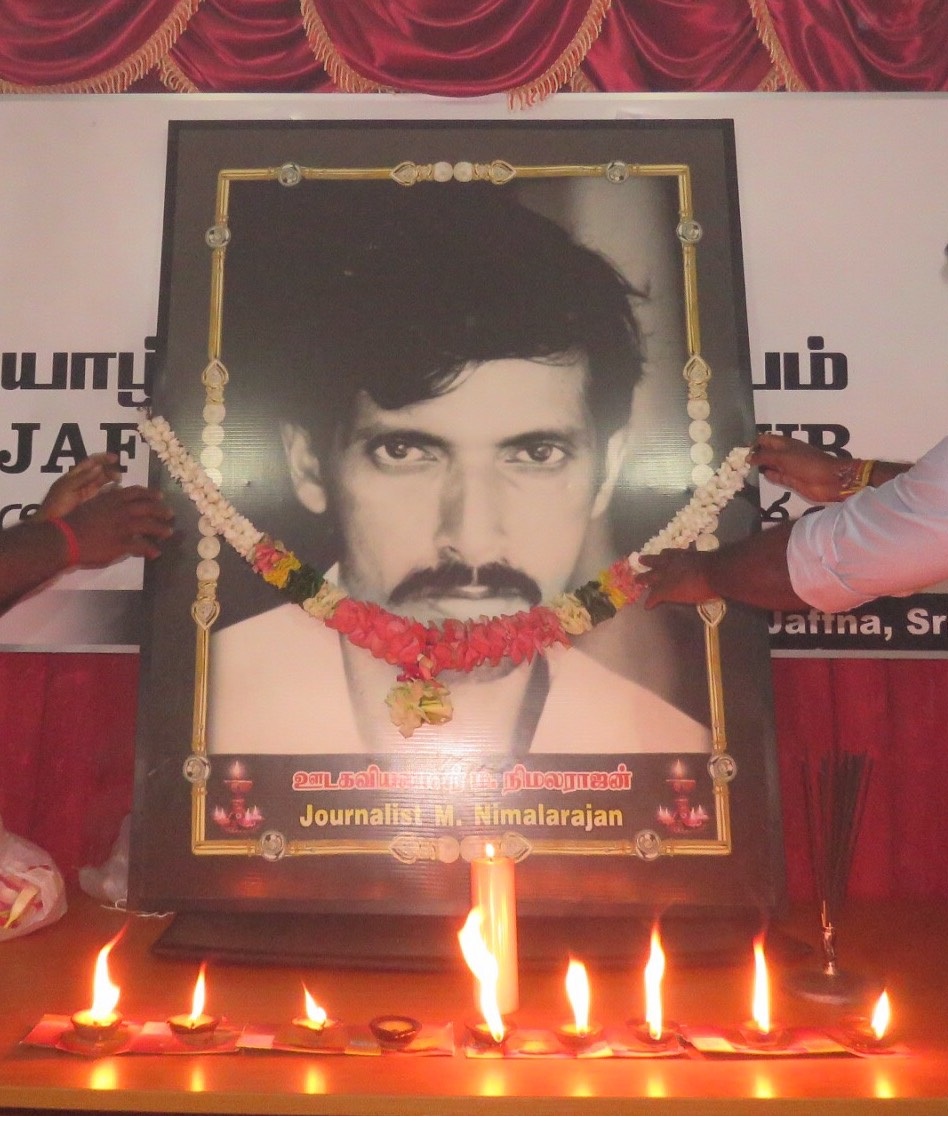
Nimalarajan, a senior journalist who contributed to the BBC Tamil and Sinhala services, the Tamil daily Virakesari and Sinhala weekly Ravaya, was murdered in his Jaffna home on October 19th 2000.
Earlier last year, the Sri Lankan Attorney General's department ordered the release of the suspects involved in the murder case. At least two other suspects were thought to have been abroad.
In March 2022, the Metropolitan Police’s War Crimes Team arrested a 48-year-old man in Britain over the murder of Nimalarajan.
In 2008, Thiyagarajah Maheswaran, a Tamil parliamentarian from the main opposition United National Party (UNP), was assassinated by gunmen at the Ponnambala Vaaneasvarar temple at Kochchikkadai in Colombo on New Year’s day.
The shooting, which also claimed the life of the MP’s bodyguard, came a few hours after Maheswaran announced on a popular television show that he would reveal details on how abductions and killings in Jaffna are managed by the Sri Lankan establishment through the EPDP.
Another notable killing was that of Atputharajah Nadarajah in Colombo in 1999.
Nadarajah edited the EPDP’s newspaper, the Thinamurusu. Despite his party position, he reportedly took an increasingly pro-LTTE line, to such an extent that the Thinamurusu became one of the most vocal critics of the the ruling veornment and then president Chandrika Kumaratunge.
Nadarajah was shot dead in November 1999. The British Refugee Council said in January 2000: “the killing of EPDP MP Atputharajah Nadarajah in November and [separately] All Ceylon Tamil Congress leader Kumar Ponnambalam in January have heightened fears. The police have stated that they would not investigate the murder of Mr Nadarajah whose writings in the Tamil journal Thinamurasu led to accusations that he supported the LTTE despite being a member of government ally, the EPDP. … Two other EPDP MPs who voted in Parliament against the extension of Emergency have fled the country and sought asylum in Britain.”
The EPDP has also been accused in a host of other murders, including the 2001 killing or wounding of several TNA candidates and supporters in Jaffna.
See also: Jaffna protests Uthayan killings
Land occupation, business contracts and extortion
In 2018, the owners of the ‘Sridhar Cinema’ building in Jaffna town filed a case against Devananda, in a bid to recover their property, which is currently illegally occupied by the EPDP and houses the party headquarters.
The Sridhar Cinema was built by the family which owns the land, on Stanley Road, in 1974 but was closed down around 1990 due to the war, when the landowners also fled Jaffna. The family wanted to reopen the cinema in 1997, when civil administration returned to Jaffna, but became aware that around December 1996, Devananda and his party “had, without their knowledge, leave, or consent, unlawfully and forcibly taken possession” of the premises.
The party had been in “illegal and unlawful occupation” of the premises ever since, the landowners lawyer said.
The theatre continues to be occupied.
In addition to the occupation of land, several business contracts continue to be controlled by the EPDP.
For example, in 2011 the Sri Lankan cabinet approved an application by Devananda to restore and commence salt manufacturing at the Elephant Pass saltern, in the Jaffna peninsula.
Another EPDP run company the ‘Maheswari Foundation’ is already involved in the illegal excavation of sand Vadamaraadchi, also in Jaffna.
Also see:
The LTTE reportedly attempted to assassinate Devananda on several occasions.
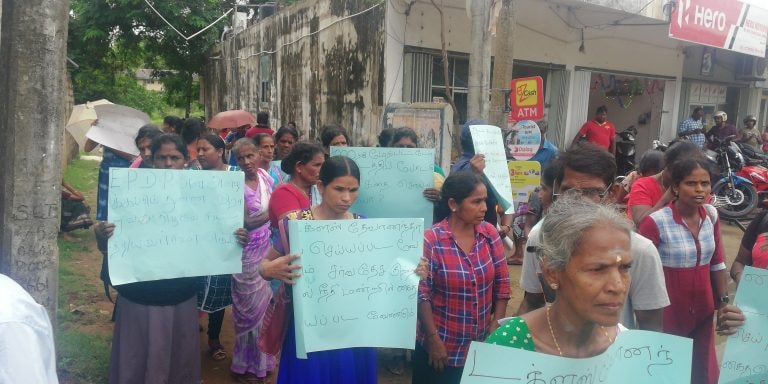
Families of the disappeared protest against the EPDP in 2020.
In recent years, Tamil families of the disappeared have protested against the EPDP calling for the arrest of Devananda.
In 2012, Tamil Nadu-based singer Unnikrishnan publicly apologised for accepting an honour from the EPDP leader at the end of a concert in Nallur, saying he had not been aware at the time that Douglas was “the leader of a paramilitary group responsible for killing scores of Tamils.” In 2017 however, a concert set to take place in Jaffna featuring Unnikrishnan was cancelled after threats from EPDP supporters. Unnikrishnan had said "Devananda is despised by Tamil people in their entirety".
With today’s announcement, however, he continues to occupy a position in Sri Lanka’s ruling cabinet.

